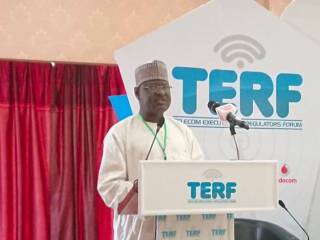"Government Must Intervene to Address Multiple Taxation, Vandalism and Right of Way at all Levels" Danbatta
The Executive Vice Chairman of the Nigerian Communications Commission (NCC), Prof. Umar Danbatta has called on governments and other stakeholders to work in tandem with the NCC to deal with the challenges militating against better service quality in the telecom sector. These challenges include multiple taxation, vandalism and refusal of appropriate authorities to approve Right of Way (RoW) for the deployment of fibre and ancillary infrastructure.
Danbatta stated this in Lagos yesterday in a keynote speech he presented to the 5th Edition of the Telecoms Executive Regulatory Forum (TERF), which held at the Oriental Hotel.
Represented by NCC’s Deputy Director, Technical Services, Wakil Bako, Danbatta also reiterated NCC's accomplishments and plans towards the provision of robust broadband penetration nationwide.
"As at September, 2017, Nigeria’s Teledensity stood at 99.93; Active Mobile subscribers stood at 139,905,213 million; and Internet Penetration rate is 50%" Danbatta told the audience.
To deepen broadband penetration and improve availability of services in the sector, Danbatta said the Commission adopted the Open Access Model for broadband penetration considering the nature of the Nigerian market. This model demands that Infrastructure companies (Infracos) would only play in layer 1B (Metro dark fibre), and layer 2 (active infrastructure layer) of the broadband ecosystem while the last mile services will be undertaken by other operators with requisite licenses in that regard.
The EVC informed the audience that NCC is equally determined to drive and support availability of high speed in Nigeria to give concrete expression to its mandate of ensuring availability, accessibility and affordability of telecom services. This is quite important because the availability of broadband infrastructure will unlock new opportunities and drive a second wave of growth in the telecommunications industry and the economy as a corollary to the exponential growth of voice services.
Initiated in 2012, the Telecoms Executives and Regulator Forum is a medium for discussion on common policy and regulatory issues affecting the sector and it attracts a rare assemblage of high-level participation of decision makers in regulation, operation and other stakeholders in both public and private spheres.
The forum provides members with the understanding and knowledge of the policy and regulatory best practices as well as information on emerging issues that Nigeria needs to consider in regulating her telecom industry and proving an enabling and sustainable environment for the sector.
5th Edition of the Telecoms Executive Regulatory Forum (TERF)
- Details
- Written by: Media Team

